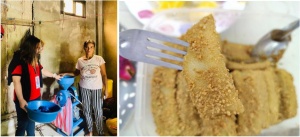
As a beneficiary of the Balik-Probinsiya, Bagong Pag-asa, and Sustainable Livelihood Program (SLP), Salvacion Saboy’s journey from economic struggle to prosperity serves as an inspiration for others seeking sustainable livelihood opportunities and a better life.
Originally from Katablangan, Conner in Apayao province, Salvacion and her husband moved to Manag, Conner in 2000, hoping to improve their lives through corn farming. While farming became their main source of livelihood, it proved inadequate to meet their family’s needs.
Seeking better opportunities, they eventually relocated to Baguio City where Salvacion’s husband worked as a jeepney driver, while she engaged in housekeeping and at the same time tried her luck in the buy-and-sell trade of clothes. This arrangement allowed them to provide for their children and achieve stability.
However, when the COVID-19 pandemic struck in March 2020, their lives were thrown into disarray. With imposed restrictions, Salvacion’s husband had to give up his job as a jeepney driver, and their buy-and-sell activities came to a halt.
Struggling to make ends meet, the family endured several months in Baguio City, hoping for an improvement in the situation. As the pandemic persisted, they were left with no choice but to rely on government assistance amid their dwindling savings.
Balik-Probinsiya Program
When the Balik-Probinsiya, Bagong Pag-asa Program (BP2) was introduced by the Department of Social Welfare and Development (DSWD), Salvacion’s family was referred by their barangay to the local government unit (LGU) for eligibility assessment. Their determination and resilience paid off as they were deemed eligible for the program.
Initially, the Saboys received PhP 30,000.00 as transitory assistance through the BP2. Additionally, they were assessed for a Livelihood Assistance Grant from the SLP and were awarded Php 50,000.00 as seed capital for their chosen livelihood project.
Salvacion’s decision to focus on native delicacy-making, specifically Sinandila proved to be a wise decision. Sinandila is a native delicacy of Kalinga and Apayao made from pounded sticky rice galapong topped with coconut curds.
With her deep knowledge of native delicacies acquired from her parents and the cultural heritage of her community, Salvacion recognized the stable market demand for Sinandila as a breakfast and merienda treat, and also as dessert during important events and celebrations.
To ensure efficient and increased production, Salvacion wisely invested in equipment and raw materials. Her daily production of up to 300 pieces of Sinandila, sold at Php5 each, translated to sales of approximately Php1,500. Starting her preparations as early as 3:00 a.m., she would sell her products often experiencing high demand resulting in sold-out products before 8:00 a.m.
The profits generated from the business were not only used for daily expenditures but also for the education of the Saboy children and the gradual rebuilding of their house.
With careful financial management, Salvacion was able to expand her microenterprise, adding materials and equipment to enhance production.
Salvacion’s forward-thinking mindset led her to plan for additional equipment for making bibingka, as she aimed to introduce a variety of native delicacies to her product line. In line with her responsibilities, she prepared to register her business with the local government unit (LGU) and the Department of Trade and Industry (DTI), ensuring compliance with legalities and branding.
Sustainable Livelihood Program
Salvacion’s remarkable journey from hardship to success showcases the benefits of the DSWD’s Sustainable Livelihood Program.
With the SLP’s support, Salvacion turned her passion for making native delicacies into a thriving microenterprise. Through financial assistance, guidance, and skill development, the SLP empowered Salvacion to build a sustainable livelihood, uplift her family’s economic well-being, and preserve her cultural heritage.
Salvacion is among the more than 3.7 million beneficiaries who have been served by the SLP from 2011 to June 2023, through its various modalities, providing livelihood and employment opportunities for them.
DSWD Assistant Secretary Romel Lopez, who is also the department spokesperson, said families, like the Saboy family, who have been assisted through the BP2 program were also given other interventions such as the SLP that will help them sustain their needs.
“We ensure that families who will go back to their hometowns will have a source of livelihood waiting for them while their other needs will be provided for by the DSWD field office,” Asst. Secretary Lopez said.
The inspiring story of Salvacion and her family stands as a testament to the DSWD’s commitment to empowering individuals and communities, proving that with determination and support from the government, dreams can become a reality. #


